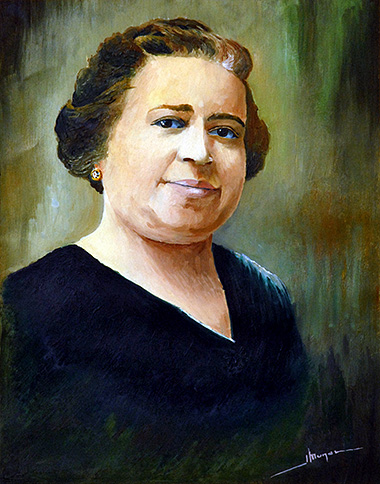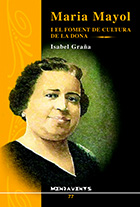Maria Mayol and the promotion of women's culture in Sóller
As any Mallorcan knows, there is one fundamental exception to the image that you might form of the Serra de Tramuntana in the early 20th century as an idyllic, traditional spot cut off from the world and the rest of Mallorca. This exception is the town of Sóller, with its traditional links with France. Today Mallorca is clearly a part of Europe, but 120 years ago this was not exactly the case. The people of Sóller's sense of initiative, their emigration to France, and trading links that they forged with the latter brought Mallorca closer to Europe and to a period of economic, cultural and social development that is famous even now.
Strangely, it was a woman who was the driving force behind one of the most conspicuous episodes in the Europeanization of Sóller and, by the extension, the Serra de Tramuntana: Maria Mayol (Sóller, 1883-Palma, 1959). Born into a well-off family, she was educated in France and was one of the first women in Mallorca with a university education. She had a degree in French language and literature from Bordeaux University. When the First World War broke out, she returned to Mallorca where, in 1921, she qualified in business and accountancy at the Balearic School of Trade.

Born into a well-off family, Maria Mayol was educated in France and was one of the first women in Mallorca with a university education
A Catholic, pro-Catalan Republican of progressive ideas, as a writer and cultural activist her name became linked with the Association for Mallorcan Culture during the difficult years of the Primo de Rivera dictatorship. She worked as a teacher in Sóller, Felanitx and Vilanova i Geltrú and published poems, articles and a play entitled Margalideta de Sortdeviu, first performed in 1931. During the Second Republic, she was first a militant of Acció Republicana de Mallorca and then Esquerra Republicana Balear. In the 1933 elections, she was a candidate for the Socialist-Republican coalition. The 1936 coup d'état caught her in Madrid. In 1939 she sought refuge in France, returning to Mallorca in the mid 1940s.
Not at all conventional and unsuited to the passive role traditionally reserved for women in Mallorcan society, Maria Mayol understood that one factor on the road to progress was women's education, both for the sake of women and for society in general. She invested all her efforts into achieving this goal. In 1926, she founded a pioneering association in Sóller called Foment de la Cultura de la Dona (the Association for the Promotion of Women's Culture), which she presided as chairwoman until 1934, when her political work took her away from Mallorca.
Inspired by other cultural women's associations in Catalonia, the Sóller Foment de la Cultura de la Dona was a forward-looking educational initiative at a time when women had little access to culture and education and such access was even frowned upon by Mallorcan society as a whole. Funded by donations from well-off Sóller families and from institutions, Foment de la Cultura de la Dona created a library and organized all kinds of educational and cultural activities conceived for women. Its activities, which today might seem very innocent, were clearly aimed at upholding women's rights at a time in which the role of women was limited to housekeeping and when there were few women with an education.
Foment de la Cultura de la Dona still exists today. It shares the facilities of Sóller Cultural Centre (no. 13 Carrer de Sa Mar) with Sóller Museum and other associations. Evidently, its activities do not have the same importance now that they had in the 1920s and 30s. Luckily we live in very different times, both from the perspective of women and education and culture in general. It is intriguing and moving to hear that, according to its current chairwomen Llum Got, it still runs activities initially conceived by Maria Mayol, like its notoriously well-attended plant and flower exhibition, coinciding with local festivities in Sóller.
Text by Jordi Martí
Translated by Rachel Waters
Did you know that...
Maria Mayol was first a militant of Acció Republicana de Mallorca and then Esquerra Republicana Balear. In 1931 she helped to draw up a draft Statute of Autonomy for Mallorca and Ibiza. She was the first female Mallorcan candidate for election to Parliament in the 1933 general elections, representing the Social-Republican coalition.
A member of the Committee for Catalan and Mallorcan Relations, together with 150 other Mallorcan writers and intellectuals, she signed the Resposta al missatge dels Catalans; a 1936 manifesto aimed at the revival of the Catalan culture and language in the Balearic Islands.
Bibliography

Maria Mayol i el Foment de la Cultura de la Dona
A very detailed study of the life and literary and cultural work of Maria Mayol. The author looks back on the life of Maria Mayol, her literary links with the Mallorcan school of literature, her friendship with members of the said group of poets and writers, like Miquel Ferrà, Joan Pons and Maria Antònia Salvà, and her involvement in the Association for Mallorcan Culture: an association that played a key role in reviving the Catalan culture and language in Mallorca. The book pays special attention to the Foment per la Cultura de la Dona de Sóller (the Sóller Association for the Promotion of Women's Culture), and its foundation and evolution during the years that it was presided by Maria Mayol. An extract from the study was published in issue no. 79 of the magazine Els Marges in the spring of 2006.
Author: Isabel Graña
Translation: Caterina Calafat
Published by: Edicions Documenta Balear, 2008




